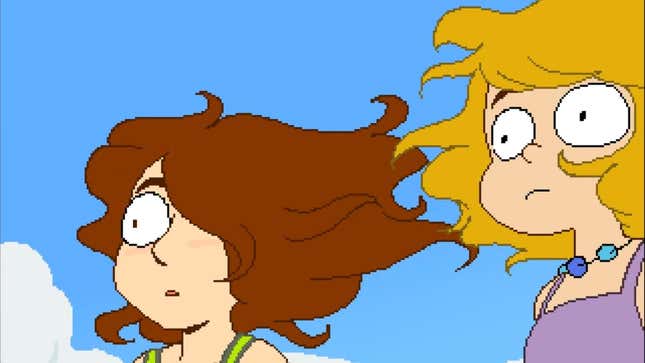
Perfect Tides is the rare game that sneaks up on you, the kind of game you don’t even see coming, yet turns out to be incredible. A point-and-click adventure game first released back in February, I hadn’t heard of it until last month, when folks I follow in games media started more and more loudly singing its praises. Now having played it myself, I understand why. It’s an extraordinarily affecting journey, one I can’t recommend strongly enough. I walked away from writer and artist Meredith Gran’s debut game feeling a wave of contradicting yet intertwining emotions. Frustration and joy, longing and warmth, hope and regret, anger and love. This nostalgic coming-of-age story about a teenage girl in the early 2000s and the ephemerality of adolescence fucked me up. It took me back to my own childhood, nicking old wounds and poking burnt coals, with such specificity I couldn’t tell if I was playing a game or reliving parts of my life. Either way, I loved every bit of it.
Developed by the creator of Octopus Pie, a comic series about two women living in New York that ran from 2007-2017, Perfect Tides has a similar kinda vibe. The story follows Mara Whitefish, an almost 16-year-old (Her birthday’s in a couple of months, OK? Leave her alone!) Jewish girl living on the remote island of Perfect Tides. City kids dream of running away to this idyllic archipelago while residents, especially children, can’t stand being on it. Why? Because there ain’t shit to do!
As Mara puts it, “there are no cars, no department stores, no asphalt or steel,” no nothing. It’s the kind of place where rich folks have summer homes and where queer people can probably feel safe, but also a bit suffocated by the deeply conservative culture of self-expression on the island. And it’s easy to feel trapped in this picturesque but limiting landscape. Hell, the only way to get off the islet is by ferry boat, which is also Mara’s only way to high school. Perfect Tides is far from perfect, and no one wants to leave the boring and empty island more than Mara and her one real-life friend Lily. It doesn’t happen–Mara is still only in high school, after all!—but teenagers can dream, and Mara dreams a lot about her future, overanalyzing her own every action in the hopes that they build into something romantically epic.

This all shakes out in the form of a point-and-click adventure game. Similar to old-school LucasArts or Sierra Entertainment classics like Day of the Tentacle and King’s Quest VI, Perfect Tides will have you incessantly clicking around the screen with the prayer of finding out what to do and where to go next. To be clear, the puzzle-solving rarely presents any real roadblocks. Many of them are optional, and whether you complete them or not doesn’t prevent you from progressing, but rather affects the game’s ending. I find this fascinating. The multiple endings and the actions you take to trigger them personalize Mara’s journey based on your moral compass, reflecting your ideals back to you. However, as cool as that is, I was bummed to reach the end only to discover after the fact that I’d missed some of these optional puzzles–and, as a result, a few tender moments between characters I could’ve experienced had I known and done them.
For example, there’s this one part around the summertime where, if you happen to combine two different items, they create something else that can be traded for a gift to be given to Mara’s asshole of a brother during Hanukkah in the winter, altering the dialogue you get and the resulting ending. Optional actions like this are brilliant because they can illustrate both Mara’s growth and our capacity to forgive others. So my issue isn’t that I didn’t know the solution to this specific puzzle, but rather that I didn’t even know it was a puzzle, an option to do or not do something, and that completing certain puzzles can change the game’s ending. I don’t want games like this to spell out their puzzle’s solutions, but Perfect Tides doesn’t always adequately clue you in to what might be possible or how it will affect the world and its characters. This does add some semblance of replayability, though.
Whatever modest frustrations Perfect Tides’ puzzles may cause, the narrative more than makes up for them. It tells a complicated story about being a teen in the early 2000s, with all the digital and real heartbreak that comes with adolescence in the internet age, as well as all the melodramatic angst and intensity that being a teen can color the world with. As the game’s four seasons pass, Mara transforms from an anxious fanfic writer and forum lurker into...whatever you make her, as you play through this formative year in her life. She can become more confident, defining her ideals as she learns that people are fallible and occasionally let us down. Conversely, she can retreat into herself as her relationships fizzle out. Mara is her own character as much as she is a conduit through which you can relive that era, and as such, it can resurface both comforting and painful memories if you happened to come of age in that era yourself. Which I did.

No, I was not a 15-year-old Jewish girl living on an island in the year 2000, and yet Meredith Gran imbues her characters with such emotional depth and nuance that I saw my own upbringing mirrored in so much of Perfect Tides. Waiting for the computer to connect to the internet, feeling your ears bleed as the AOL dial-up noise screeched from the speakers, befriending—and eventually “dating”—an internet stranger, watching friends slowly drift away, contemplating the temptation of a quiet death. With each in-game revelation, each season coming to a close, I couldn’t help but wonder if Meredith and I were the same, or if the millennial experience was just that universal.
There’s something about the way Meredith Gran wrote Mara, the shackling insecurity that bars the teenager from normal social interactions, that not only clued me into Mara’s own erratic mental state but also reflected my own adolescent struggles back at me, as if Gran had some crystal ball peering into my life. Her depiction of teenage angst is on point, and the push and pull between Mara’s desires for intimacy and her inner critic’s overprotective nature is both frustrating and understandable. It’s remarkable just how authentic these characters feel, how they make mistakes sometimes even knowing how dumb those mistakes are. Even if you didn’t grow up in the early 2000s, the complexity, compassion, and humanity with which Gran captures adolescence transcends its period setting, capturing something real and true about the excitement and anguish of growing up.
As the credits rolled, I felt a lot of regret for my Mara who, despite my best intentions, made some of the same mistakes I did as a teenager, many of which may have been avoidable if it weren’t for the desperate yearning for approval. Still, there’s hope for Mara. As a fresh-faced 16-year-old, she’s got her whole life ahead of her, one full of trials and tribulations, but one worth living all the same.
That’s probably the single most salient note to take away from Perfect Tides’ conclusion. As long as there is breath in your lungs, you can always start fresh. Mara might not leave Perfect Tides, and many of her friends on the island may not remain so for long, but there’s comfort in knowing you can reinvent yourself every day. It’s a lesson Mara grows to accept regardless of the ending you wind up with, and it’s a beautiful one we could all learn from.